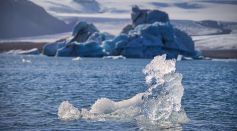ENVIRONMENT & CLIMATE
Tetrapods Older Than Initial Records; Have Fastest Aquatic to Land Vertebrate Evolution Rate Recorded
Tortoise Diet: Watch How This Giant Reptile Goes in for the Kill for Its Not-so-Usual Meal
Mesospheric Ozone Layer Depletion: What Role Does It Play in the Global Climate Change?
Triantha Occidentalas: Flowering Plant Eats Insects Walking up Its Sticky Stalk

Energy Efficiency in US Buildings Could Decrease Thousands of Annual Premature Deaths Due to Particulate Matter

Wildfire Containment: Here’s Why It Sometimes Takes Long to Put the Flames Out
Mammoth Fossil Found in Florida; Another Leg Bone Discovery in the State from Prehistoric Period

Largest Coral 'Muga dhambi' Discovered in Goolboodi, Great Barrier Reef
Largest Carbon Reservoir: New Study Estimates Deposit in Earth’s Outer Core
Billion-Year Geologic Record Gap: Grand Canyon's Great Unconformity Possibly Due to Rodinia's Breakup
Geothermal Activity Under Antarctic Ice Sheet Bring Thwaites Glacier on Brink of Collapse Due to Excessive Melting

Four Storms, Wildfires Over North American Continent Captured Via Satellite Imaging
Why is White Clover Poisonous? Study Claims Its Chemical Defense Mechanism Resulted From Hybridization

Antarctic Ice Sheet's Rising Sea Levels Could Be 'Countered' by Snowfall Induced Through Warming Ocean of Northern Hemisphere
Most Popular

Can Humans Achieve Immortality? Latest Scientific Advances in Longevity & Lifespan

What Happens to the Body During Sleep? Brain Repair, REM Cycles, and Nightly Recovery

Ocean Exploration: How Deep Sea Research and Marine Technology Reveal the Ocean Floor Without Going There

James Webb Space Telescope Discovers Closest Galaxy to the Big Bang Ever Observed




